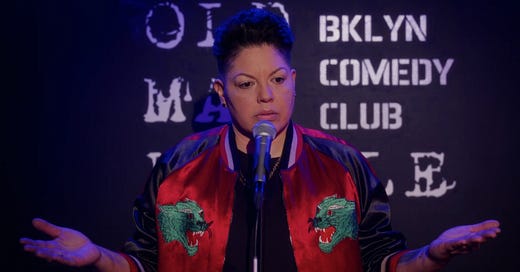We Need to, Respectfully, Talk About That Sara Ramírez IG Post
Somebody call Samantha Jones Public Relations, stat.
The Season 2 episode of Sex and the City titled “They Shoot Single People, Don’t They?” finds Carrie selected to be in a New York Magazine profile of 20 Manhattan singles. The article is set to be titled “Single And Fabulous!” A night of shots and dancing with the girls finds our protagonist dragging her ass home at dawn on the morning of the shoot. To avoid looking like she’d stayed up all night, Carrie attempted to stay up all morning, but she eventually crashed. She arrives “about a fucking month late” to the shoot, throws off her poncho and sits for her portrait session. “Is there gonna be time for make-up?” she asks as flashbulbs go off. She’s promised that they’re just taking a few test shots to check the lighting. “Do you mind if I smoke?” she asks. “I don’t mind if you shoot up,” the photographer tells her.
Ostensibly weeks later, on a bodega run to get cigarettes (“having smoked all my cigarettes during a workout, I stopped for fresh supplies,” comes the voiceover), Carrie is shocked to discover the latest issue of New York Magazine featuring her chain-smoking, makeup-less mug looking back at her. “Single and Fabulous question mark,” she tells the girls at brunch later that morning. “There was no question mark implied… I was set up!” Samantha agrees, telling her she’s “single, fabulous and fucked.”
In June, New York Magazine’s The Cut ran a profile of And Just Like That… star Sara Ramírez, written by features writer Brock Colyar and timed to the release of the show’s second season. The article was titled “Hey, It’s Sara Ramírez. They’ve heard your Che Diaz jokes,” a riff on the meme’d-to-oblivion “hey, it’s Che Diaz” line that circulated during the show’s first season.
It’s clear early on in the article that Colyar feels some type of way about their subject (Colyar, like Ramírez, identifies as non-binary and uses they/them pronouns). Colyar pointedly refers to Ramírez “lecturing” them and writes that it’s “all a bit heavy, or maybe just heavy-handed, and very… Che Diaz.” The article could either be viewed as mean-spirited and snarky or as an attempt to push back on the subject’s lack of awareness of intention vs reception. It’s not a barn burner, but one can understand that this would not be the profile Sara Ramírez, much like Carrie Bradshaw in that SATC episode, would have signed up to participate in had they known the outcome.
Like a fart, the profile came and went after dropping on June 20th, 2023. Then, seemingly out of nowhere, hours before it was announced that And Just Like That… would return for a third season, Sara Ramírez broke their silence in a scathing Instagram post in response to the story. “Been thinking long and hard about how to respond to The Hack Job’s article, ‘written’ by a white gen z non-binary person who asked me serious questions but expected a comedic response I guess (?),” Ramírez began in their lengthy caption. They went on to call Colyar a “petulant child” who “attempt[ed] to mock [Ramírez’s] thoughtfulness and softness, while dismissing a valid existence and real human being.”
Ramírez then asserts something they’d previously stated in the profile: “I am not the fictional characters I have played, nor am I responsible for the things that are written for them to say.” But as Colyar highlighted in the piece, “Ramírez’s Instagram bio describes themself as ‘abolicious’ and a ‘MexicanIrishNon-binaryHuman,’” which sounds vaguely similar to how Che introduces themselves as a “queer non-binary Mexican-Irish diva” in the pilot of the series. (It should be noted that Ramírez has since removed this IG biography.)
Ramírez then lists a number of what they call “friendly reminders,” which include mentioning that “I can love women (and I do), while not identifying as one” (something Colyar never called into question), “feminists come in all genders” (something, too, Colyar never called into question) and, most curiously, “When a cis man is in charge and has ultimate control of dialogue actors say, and you have a valid problem with it, perhaps you should be interviewing him.” I can’t help but fixate my eyes on the operative “valid.”
There is, of course, precedent to profile subjects pushing back at the final product.








